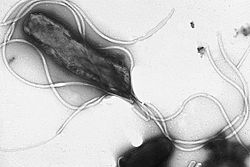Helicobacter pylori facts for kids
Quick facts for kids Helicobacter pylori |
|
|---|---|
 |
|
| Scientific classification | |
| Kingdom: | |
| Phylum: | |
| Class: |
Epsilon Proteobacteria
|
| Order: |
Campylobacterales
|
| Family: |
Helicobacteraceae
|
| Genus: |
Helicobacter
|
| Species: |
H. pylori
|
| Binomial name | |
| Helicobacter pylori ((Marshall et al. 1985) Goodwin et al. 1989)
|
|
Helicobacter pylori (often called H. pylori) is a tiny, spiral-shaped bacterium. It lives in the lining of your stomach. This special germ is known for causing most ulcers. Ulcers are like small sores that form in the stomach or the first part of the small intestine, called the duodenum.
Before 1982, many doctors thought that things like spicy food, too much stomach acid, or stress caused ulcers. But then, two Australian scientists, Barry J. Marshall and J. Robin Warren, made an amazing discovery. They found H. pylori and showed it was the real cause of most ulcers. For their important work, they won the Nobel Prize in Physiology or Medicine in 2005. Because of their discovery, doctors can now treat and cure most ulcers with special medicines called antibiotics.
Contents
What is H. pylori?
H. pylori is a type of bacteria that has a unique spiral shape. This shape helps it move around in the thick, protective mucus layer of your stomach. It is one of the few bacteria that can survive in the very acidic environment of the stomach.
How H. pylori Causes Problems
Your stomach has a strong acid that helps digest food. It also has a layer of mucus that protects its lining from this acid. H. pylori can live right under this mucus layer.
Damaging the Stomach Lining
When H. pylori lives in your stomach, it can cause problems in a few ways:
- It produces substances that weaken the stomach's protective mucus.
- It can also make the stomach lining more likely to get inflamed. This inflammation is called gastritis.
- Over time, this damage can lead to sores or ulcers forming in the stomach or duodenum.
Ulcers and Other Issues
Ulcers can cause pain and discomfort. If left untreated, they can sometimes lead to more serious problems. In some rare cases, a long-term H. pylori infection can even increase the risk of certain types of stomach cancer.
Symptoms of an H. pylori Infection
Many people who have H. pylori in their stomach never feel sick or have any symptoms. But for those who do, the symptoms are usually related to gastritis or ulcers.
Common Symptoms
- A burning pain in your stomach, especially when your stomach is empty.
- Feeling bloated or full after eating only a little food.
- Nausea (feeling sick to your stomach).
- Loss of appetite.
- Frequent burping.
If you have these symptoms, it's important to talk to a doctor. They can help figure out what's going on.
How Doctors Find H. pylori
Doctors have several ways to check if someone has an H. pylori infection. These tests are usually simple and not painful.
Common Tests
- Breath Test: You drink a special liquid, and then breathe into a bag. The test checks for a gas that H. pylori produces.
- Stool Test: A small sample of your poop is checked for signs of the bacteria.
- Blood Test: This test looks for antibodies in your blood that show your body has fought the infection.
- Endoscopy: In some cases, a doctor might use a thin, flexible tube with a camera (an endoscope) to look inside your stomach and take a tiny sample (biopsy). This sample can then be tested for H. pylori.
Treating H. pylori Infection
If a doctor finds that you have an H. pylori infection, it can usually be treated with medicine.
Treatment Plan
- Antibiotics: Doctors usually prescribe a combination of two or more different antibiotics. This helps make sure all the bacteria are killed.
- Acid-Reducing Medicines: You might also take medicines that reduce the amount of acid in your stomach. This helps the ulcers heal faster.
It's very important to take all the medicine exactly as your doctor tells you, even if you start feeling better. This helps make sure the infection is completely gone. After treatment, doctors often do another test to confirm that the H. pylori is no longer there.
Images for kids
See also
 In Spanish: Helicobacter pylori para niños
In Spanish: Helicobacter pylori para niños
 | Toni Morrison |
 | Barack Obama |
 | Martin Luther King Jr. |
 | Ralph Bunche |



